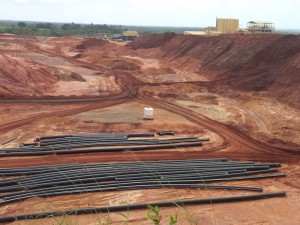Excerpts
Kenya’s Mining Cabinet Secretary, Dan Kazungu; Kenya has a $30 million budget for an aerial mineral survey, and will also start a mineral data bank & audit unit
- Kenya has gold, coal, iron, copper, titanium, niobium, fluorspar, limestone, CO2 (carbacid in Kiambu), gypsum and gems.
- In April, the cabinet approved a mining & mineral policy, and in May, Kenya repealed the 1940 mining act and replaced it with a new progressive law. The mining act 2016 aligns itself to 3 documents – the 2010 Constitution, Kenya Vision 2030 and the AU Africa mining guidelines
- Mining was an environmental ministry department until Jubilee made @madinikenya an economic transformation pillar.
- The new application laws are simple, clear, predictable and transparent for a level playing field. They engaged the industry and there will be no more single-person decisions. Committees will give feedback on mining requests in 3 months with reasons, and if mining applications are for worth more than $500 million, it has to go through Parliament.
- Intra-Africa trade can also include legally-trade minerals i.e make Kenya a trading hub (not a smuggling one)!
Patrick Obath: How can Kenyans get more mining information? Right now it’s only in the gazette which hardly anyone reads.
Martin Ayisi: Kenya law now recognizes artisanal mining . . can have impact like Mali where they produced 23 tons of gold worth $742 million in 2015
- Kenya government can now award some mineral rights by tender, as opposed to the first -come, first-served way.
- Prospecting consent is guaranteed by law .. the challenge is when to apply for formal permission.
- Mining investors hate when governments change the rules midstream.
- Kenya is creating a national mining corporation but there have not been success stories in Africa. Nevertheless, they will take on lessons from Ghana and Zambia and learn from those.
Dominic Rebelo: Miners are concerned that at the end of licenses, all assets go to the Government (immovable ones go to the national government, and movable ones to the county government) ..some investors will scale back operations and sell-off (strip) assets to preempt this before their licenses end.
- Mining companies and mining support companies will be licensed and have comprehensive disclosure & progress report requirements. This is to lock out briefcase ones, or people who sit on licenses for speculation.
- Large mining companies are to list 20% in 3 years, but stock exchanges require 5 years of profit – there may be a need to create a special stock exchange for mining companies. Also, the government gets 11% for free (10% equity + there’s 1% stamp duty to be paid).
- If a mining investor finds a strategic mineral, they have to stop operations indefinitely & declare the find. There needs to be certainty of what is defined as a strategic mineral, and a defined process of getting a mineral on or off that list.
